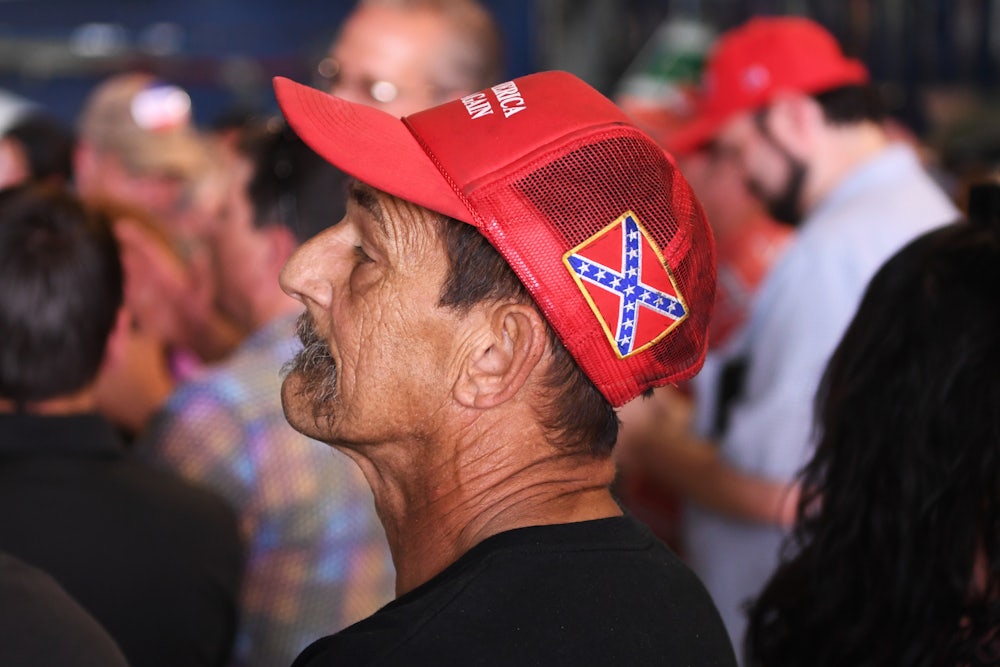Those of us soul-searching for reasons Donald Trump has been able to erase Hillary Clinton’s formidable mid-summer lead have homed in on several plausible explanations, from media failures to Clinton’s health scare. What has largely escaped serious consideration is the fact that Trump, as a candidate, has improved.
The Republican nominee hasn’t improved in the sense that he suddenly stands for good ideas or has boned up on policy in any serious way. But if Trump’s campaign bottomed out when he mocked the Muslim immigrant family of a dead Iraq war soldier, it is now clearly less erratic. As odious as they may be in their views and public roles, his new top aides, Steve Bannon and Kellyanne Conway, have brought at least some measure of discipline to the most id-driven candidate in living memory. Trump now reserves his ire for journalists and news outlets rather than Gold Star families. He’s even found it within himself to express sympathy with victims of police shootings and grudgingly admit that Barack Obama was born in the U.S.
If unfavorable news coverage drove Clinton’s numbers downward, Trump’s modicum of discipline might partly explain why his numbers have crept up between mid-August and today. Granted, he has cleared a bar of professionalism so low it could be confused for a tree root. But because much less of what he says now is gut-level extemporaneous pandering, Trump has also compelled us to treat his pronouncements with more seriousness. And the unsurprising picture that has emerged is of a considered, coherent, and horrifying program of white supremacy.
This week, Trump has floated a vast punitive policy regime that would mostly leave white communities untouched.
In multiple comments on Wednesday and Thursday, he called for the revival and expansion of stop-and-frisk policing quotas, which amount to government-mandated profiling and harassment of inner city black men. “They’ll stop, they’ll frisk, and they’ll take the gun away, and they won’t have anything to shoot with,” Trump explained on Fox News. That Trump proposed this during what has been described as a campaign of “outreach” to black voters is almost as jarring as the breeziness with which Trump—who falsely accuses Clinton of wanting to repeal the Second Amendment—advocates taking guns away from black people. The single explanation for both contradictions is that Trump is championing, as a safety measure for black communities, a policy that whites want to impose for their own sense of security.
Also this week, Trump admitted that he wants to ban Muslims and Syrian refugees from entering the U.S. not just as a dubious security measure, but as “a matter of quality of life.” In a similar vein, he has proposed stripping U.S. citizens suspected of jihadi terrorism of their due process rights, an idea that echoes in alarming fashion his past praise of Saddam Hussein as an efficient extra-judicial terrorist killer. He extended this pattern to non-security issues in promising that under his administration, the country will be rebuilt with “American hands … not the hands of people from other countries.”
In examining why Jewish conservatives have largely fled the GOP this cycle, Jonathan Chait recently wrote, “The whiff of Herrenvolk democracy … is an especially frightening phenomenon to those who suspect they’re not included among the Volk.” It’s more frightening still when even the vestiges of democracy turn out to be negotiable: All of Trump’s above ideas, after all, are likely or clearly unconstitutional. He envisions an America in which a variety of legal and constitutional rights don’t apply to millions of minorities—a regime constructed for the enrichment and safeguarding of white people, where the principle of equal protection is eroded into meaninglessness.
And this, supposedly, is Trump at his most docile and controlled—proposing the imposition of a white ethnocracy.
